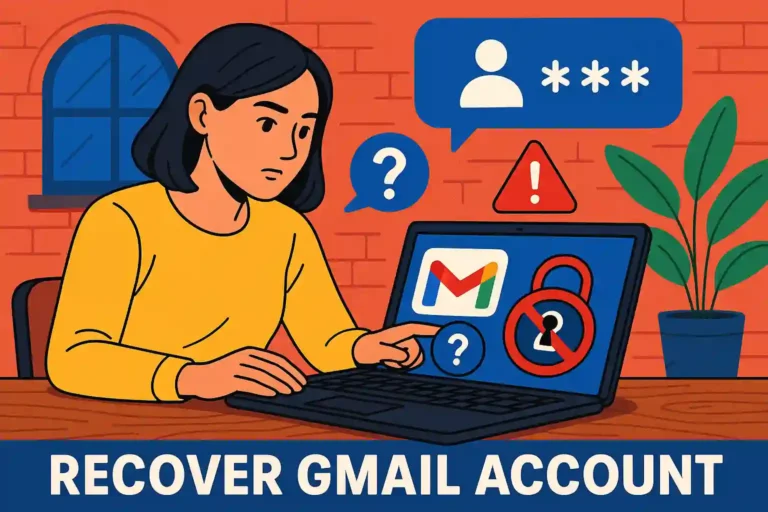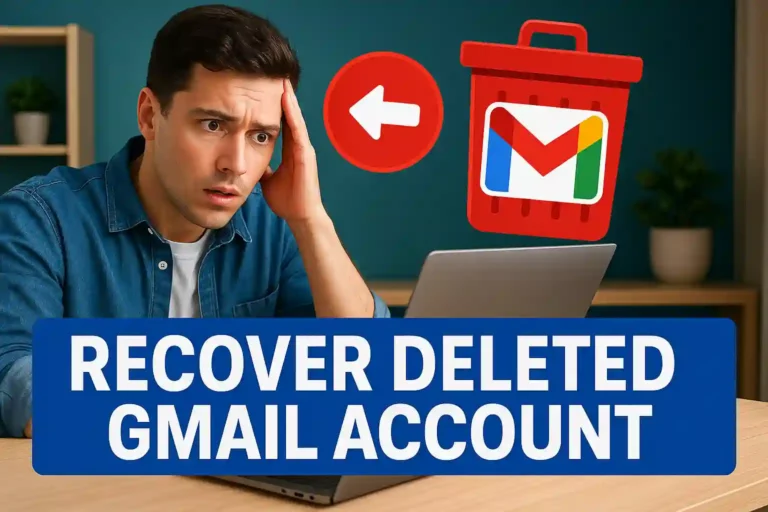Google Account Recovery Without Phone: access tips for 2025
Knowing Google account recovery without phone number methods protects your data when standard access fails.
Discover alternative authentication paths that bypass mobile verification while maintaining account security standards.
You will remain on the current site.
Learn proven recovery techniques that restore Gmail access using backup codes, emails, and verification methods today.
Understanding Email-Based Google Account Recovery
Modern email-based Google restore systems offer multiple pathways when mobile verification becomes unavailable for users worldwide.
Gmail help without number starts with accessing your recovery email address through Google’s automated verification system.
Recovery emails receive verification codes within minutes, enabling users to regain control without requiring mobile device access.
Setting Up Recovery Email Options
Primary recovery emails should differ from your main Gmail address to prevent circular dependency during account lockouts.
Secondary recovery options include work emails, family member accounts, or dedicated backup email addresses for emergencies.
Google validates recovery emails through confirmation links sent during initial setup, ensuring legitimate ownership verification.
Comprehensive Gmail Recovery Options Available
Multiple Gmail recovery options exist beyond traditional phone verification, including backup codes and security questions.
Account recovery forms allow users to verify identity through personal information when standard methods fail completely.
Google’s automated systems recognize device patterns, location history, and account activity to verify legitimate access attempts.
Security Question Verification
Security questions provide backup authentication when primary and secondary recovery methods become temporarily unavailable for users.
Accurate answers to previously configured questions trigger automated account restoration without requiring external device verification.
Question complexity should balance security with memorability, avoiding information easily discovered through social media research.
Device Recognition Systems
Trusted device recognition allows Google to identify previously authorized computers, tablets, and smartphones for authentication.
Browser fingerprinting technology analyzes device characteristics, creating unique signatures for each authorized access point.
Location-based verification cross-references login attempts with historical access patterns to identify legitimate users automatically.
Google Fix Login Issues Through Backup Codes
Learning to Google fix login issues using backup codes prevents permanent account lockout during recovery situations.
Generated backup codes function as single-use passwords, providing emergency access when primary authentication methods fail.
Each Google account generates ten unique backup codes, stored securely offline for emergency access situations.
Generating and Storing Backup Codes
Backup code generation requires accessing Google Account security settings while logged in through traditional authentication methods.
Physical storage options include printed copies, secure password managers, or encrypted digital files stored on offline devices.
Regular backup code regeneration ensures old codes become invalid, maintaining security while providing fresh emergency access options.
Key backup code management practices include:
- Print codes immediately after generation
- Store copies in multiple secure locations
- Update codes every six months
- Never share codes with unauthorized individuals
- Keep codes separate from primary devices
Support Gmail Access Through Account Recovery
Professional support Gmail access involves systematic approaches combining multiple verification methods for comprehensive account restoration.
Account recovery wizards guide users through step-by-step processes, increasing success rates through structured verification procedures.
Google’s customer support provides specialized assistance for complex recovery situations requiring manual intervention and verification.
Account Recovery Form Completion
Detailed recovery forms require accurate personal information including account creation dates, frequently contacted addresses, and password history.
Recent activity descriptions help Google verify legitimate ownership through specific emails sent, files accessed, or purchases made.
Recovery form submissions trigger manual review processes, typically completed within 24-48 hours depending on verification complexity.
Essential recovery form information includes:
- Account creation date and location
- Previously used passwords
- Recent email contacts
- Google service usage patterns
- Purchase history and payment methods
How to Login Gmail Email Only Methods
Understanding how to login Gmail email only requires utilizing alternative authentication bypassing traditional two-factor verification.
Email-only access involves disabling mobile verification temporarily through account security settings during successful login sessions.
Emergency access protocols allow users to authenticate using email verification codes sent to designated recovery addresses.
Disabling Two-Factor Authentication
Two-factor authentication removal requires current password verification plus additional security checks for account protection purposes.
Temporary disabling allows emergency access while maintaining long-term security through re-enabling after recovery completion.
Account security reviews recommend re-enabling two-factor authentication immediately after resolving access issues or device problems.
Backup Code Gmail Implementation Strategies
Effective backup code Gmail systems require proactive planning before account access issues develop into permanent lockouts.
Code implementation involves generating, storing, and testing backup authentication methods while maintaining primary account access.
Strategic backup planning includes multiple recovery layers, ensuring account accessibility during various emergency scenarios.
Testing Backup Recovery Methods
Regular testing verifies backup code functionality without compromising primary account security or triggering unnecessary recovery procedures.
Test procedures involve simulating lockout scenarios using backup codes while maintaining alternative access through trusted devices.
Quarterly testing schedules ensure backup methods remain functional while identifying potential issues before emergencies occur.
Recovery testing checklist includes:
- Verify backup codes work correctly
- Test recovery email accessibility
- Confirm security question accuracy
- Validate trusted device recognition
Complete Account Gmail Guide for Recovery
Comprehensive account Gmail guide documentation provides systematic approaches for various recovery scenarios and emergency situations.
Step-by-step recovery procedures address common lockout causes including forgotten passwords, lost devices, and compromised accounts.
Recovery guides include troubleshooting sections for complex situations requiring multiple verification methods and manual intervention.
Advanced Recovery Techniques
Advanced recovery involves combining multiple authentication methods when standard procedures fail to restore account access completely.
Manual verification processes require detailed account history, including creation circumstances, usage patterns, and personal information verification.
Professional recovery assistance becomes necessary for high-value accounts containing critical business data or irreplaceable personal information.
Email Login Gmail Troubleshooting
Systematic email login Gmail troubleshooting identifies specific causes preventing successful authentication through recovery methods.
Common issues include incorrect recovery email addresses, expired backup codes, or outdated security question answers.
Diagnostic procedures help isolate problems, enabling targeted solutions rather than attempting multiple recovery methods simultaneously.
Common Recovery Obstacles
Recovery obstacles often involve outdated account information, including changed phone numbers, expired recovery emails, or forgotten security details.
Account compromise situations require additional verification steps, including identity confirmation through government identification or payment history.
Technical issues may prevent recovery email delivery, requiring alternative communication methods or direct customer support contact.
Troubleshooting steps for recovery issues:
- Verify recovery email address accuracy
- Check spam folders for verification messages
- Ensure backup codes remain unused
- Confirm security question spelling accuracy
- Update browser and clear cache data
Conclusion
Mastering Google account recovery without phone number techniques protects valuable data while maintaining account accessibility during emergencies.
Proactive recovery planning through backup codes, recovery emails, and security questions prevents permanent account lockout situations.
Regular testing and updating of recovery methods ensures reliable access while maintaining robust security standards for personal information protection.
Frequently Asked Questions
Can I recover my Gmail account without a phone number?
Yes, Google provides multiple recovery options including backup codes, recovery emails, security questions, and account recovery forms for authentication.
How long does Gmail account recovery take without phone verification?
Recovery typically takes 24-48 hours for manual reviews, while automated methods using backup codes or recovery emails work within minutes.
What information do I need for Gmail account recovery forms?
Recovery forms require account creation dates, previous passwords, recent contacts, service usage patterns, and detailed account activity descriptions.
Are backup codes secure for Gmail recovery?
Backup codes provide secure emergency access when stored properly offline, functioning as single-use passwords for account authentication.
Can I disable two-factor authentication to access Gmail easier?
Two-factor authentication can be temporarily disabled during recovery, but re-enabling immediately after access restoration maintains optimal account security.






